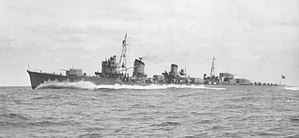 Amatsukaze on sea trials off Uraga on 17 October 1940
| |
| History | |
|---|---|
| Name | Amatsukaze |
| Ordered | 1937 |
| Builder | Maizuru Naval Arsenal |
| Laid down | 14 February 1939 |
| Launched | 19 October 1939 |
| Commissioned | 26 October 1940 |
| Stricken | 10 August 1945 |
| Fate | Scuttled after air attack, 10 April 1945 |
| General characteristics | |
| Class and type | Kagerō-class destroyer |
| Displacement | 2,490 long tons (2,530 t) |
| Length | 118.5 m (388 ft 9 in) |
| Beam | 10.8 m (35 ft 5 in) |
| Draft | 3.8 m (12 ft 6 in) |
| Speed | 35.5 knots (40.9 mph; 65.7 km/h) |
| Complement | 240 |
| Armament |
|
| Service record | |
| Commanders: | Cmdr. Tameichi Hara (April 1940 – January 1943) |
| Operations: |
|
| Victories: |
|
Amatsukaze (天津風, "Heavenly Wind") was a Kagerō-class destroyer of the Imperial Japanese Navy. Captained by Tameichi Hara throughout 1942, Amatsukaze saw heavy combat. She took part in the capture of several key areas in the Philippines and Dutch East Indies, notably when she captured the port of Davao, bombarding the shores and destroying attempts by machine gunners to halt the landings and destroying a Philippine oil tanker in the process.
Amatsukaze saw combat at the battle of the Java Sea, but only took part in a torpedo attack that failed to score any hits. However, in the battle's aftermath, Amatsukaze assisted in capturing the hospital ship SS Op Ten Noort. Amatsukaze then took part in patrol duties in the Java Sea, where she helped to sink the submarines HNLMS K X and USS Perch. Amatsukaze escorted Admiral Yamamoto's battleship force during the battle of Midway, and escorted carriers during the battles of the Eastern Solomons and Santa Cruz.
Amatsukaze probably saw the highlight of her career at the first naval battle of Guadalcanal, November 13, 1942, fighting an allied cruiser force at point blank range. With torpedo hits, Amatsukaze sank the destroyer USS Barton and helped to sink the light cruiser USS Juneau, before she shelled the crippled heavy cruiser USS San Francisco, but was herself crippled by shellfire from the light cruiser USS Helena, but managed to survive and withdraw from the battle.
Upon being repaired, Amatsukaze saw a variety of escorting roles throughout 1943, bit did not see combat. On January 16, 1944, Amatsukaze was damaged beyond repair by a torpedo fired from the submarine USS Redfin which blew her in two. The forward section rapidly sank, but the aft section miraculously stayed afloat and was towed to Singapore, where she spent nearly the rest of her service. In March 1945, what was left of Amatsukaze was rigged with a temporary bow and departed in a vain attempt to make it to mainland Japan, but on April 6 she was forced to run aground after being hit by land-based air attacks, and finally scuttled on April 10.
After the war, Tameichi Hara published a book on his experiences as a destroyer captain, which included a detailed service of his time aboard Amatsukaze and the combat she went through.